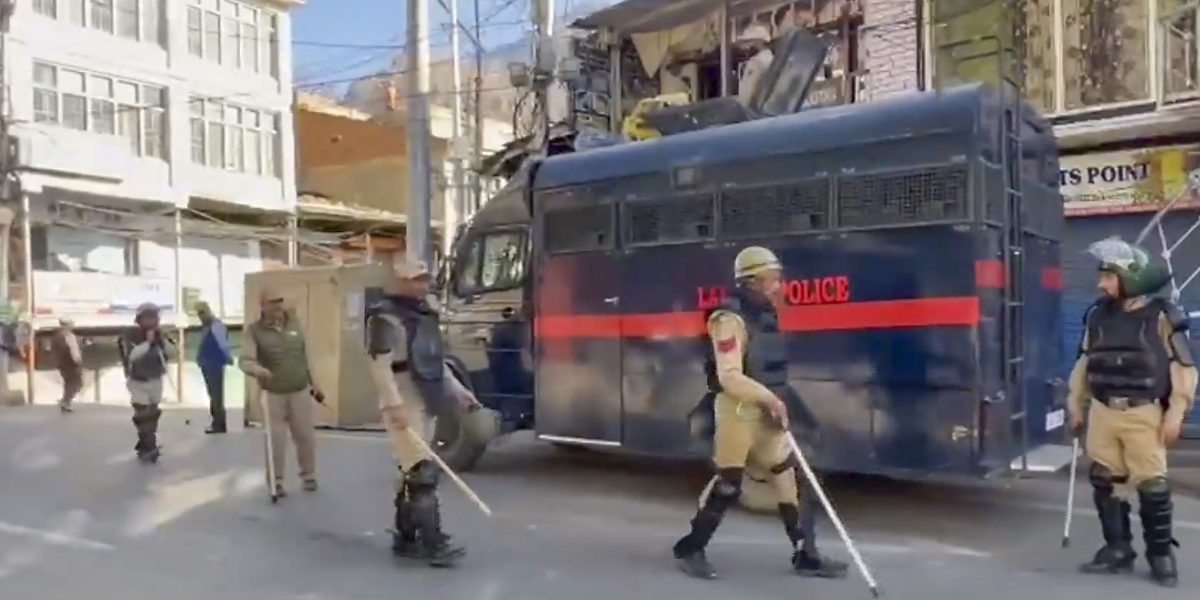New Delhi accuses nonviolent activist for unrest over special status in Ladakh
Four civilians die in clashes between protesters and security forces in Leh during rally for statehood and greater protections for tribal communities. A curfew has been imposed, with gatherings, marches, and rallies banned. The government accuses climate activist Sonam Wangchuk, known for his nonviolent protests, of inciting the crowd with “provocative” slogans. The opposition denounces broken promises and calls for sensitive management of the crisis in a region crucial for relations with China.
Leh (AsiaNews) – Four people are dead and more than 45 injured after a day of protests in Leh, the capital of Ladakh, where Indian authorities today imposed a curfew and other stringent security measures.
Initially peaceful, the demonstrations were sparked once again by demands that the Indian government grant the region Union State status and implement the Sixth Schedule of the Indian constitution, which provides for and regulates the autonomy and self-governance for India's tribal areas.
In Ladakh, a Himalayan region that borders China and Pakistan, 97 per cent of the population belongs to tribal communities.
Yesterday, the cities of Leh and Kargil came to a standstill with offices, markets, schools, banks, and commercial activities closed, while public and private transportation halted, witnesses told local media.
Stones were thrown, vehicles torched, and the headquarters of the Bharatiya Janata Party (BJP), the ultranationalist Hindu party led by Prime Minister Narendra Modi, set on fire.
The four people killed were all civilians shot during clashes with the security forces, whose actions the government justified as self-defence. Some 30 officers were injured in the violence.
To ensure public order, the deputy commissioners of Leh and Kargil issued orders based on the new Section 163 of the Indian Citizen Safety Code (Bhāratīya Nāgarik Surakśa Saṃhitā), banning gatherings of more than five people, processions, rallies, as well as the use of loudspeakers and electronic messages that could "disturb [the] peace or provoke enmity”.
The authorities warned that "violations of the order will invite strict legal action”.
The Union Home Ministry blamed the violence on well-known climate activist Sonam Wangchuk, who began a 35-day hunger strike on 10 September to support demands for constitutional guarantees for Ladakh.
The activist has used this form of nonviolent protest several times in the past, especially to draw attention to the rapidly melting ice in the Himalayas.
However, on this occasion, Wangchuk broke his fast and called for restraint after clashes broke out between young people and security personnel near the office of the Ladakh Autonomous Hill Development Council.
Indian authorities accused him of “provocative mention of Arab Spring-style protest and references to Gen Z protests in Nepal,” where people under 30 recently led protests against the previous government.
In a statement, the ministry claimed that “politically motivated individuals were not happy with the progress” in ongoing talks between government representatives and Ladakhi groups and tried “to sabotage the dialogue process.”
The unrest broke out on the eve of a meeting between Home Ministry officials and local leaders.
Local demands for exclusive land rights have gone unheard for years, yet the ministry has claimed "phenomenal results" in negotiations initiated with the Apex Body Leh and the Kargil Democratic Alliance, two groups that have represented local political interests since 2020.
The achievements listed by the central government include higher public sector employment quotas for tribal communities from 45 per cent to 84 per cent, a 33 per cent quota for women in local councils, and the official recognition of the Bhoti and Purgi languages.
The current political gridlock is a direct consequence of Prime Minister Modi’s decision in 2019 to abolish Kashmir's special status, creating one administration for the region now called Jammu and Kashmir and another for Ladakh.
In recent years, local concerns have grown regarding the preservation of cultural identity and the protection of natural resources.
The inclusion of Ladakh in the Sixth Schedule of the Constitution would allow the creation of autonomous councils for land management, public health, and agriculture.
Ten such councils exist in Assam, Meghalaya, Tripura, and Mizoram, the only states where the legislation is in force.
Meanwhile, Indian political parties are blaming each other for the troubles. BJP spokesperson Sambit Patra accused the opposition, represented by the Indian National Congress, of being behind the incidents, naming a Leh municipal councillor as the “main instigator”.
The opposition, however, stressed Ladakh's strategic location, which India has always used as a buffer against Chinese ambitions with INC Lok Sabha Members Manish Tewari noting that Ladakh was a border Union Territory.
For Peoples Democratic Party chief Mehbooba Mufti, “People seem to have lost patience, feel betrayed” following the abrogation of Kashmir's special status in 2019. “Leh, a region long known for its peaceful and measured protests, is now witnessing a disturbing shift toward violent demonstrations,” she lamented.
23/02/2024 19:29







.png)










